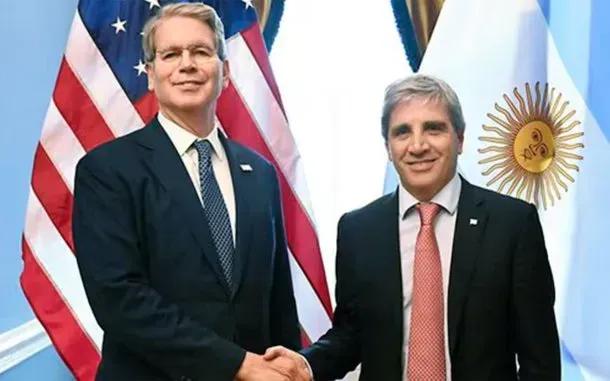There are economic decisions that transcend macroeconomics and enter the realm of the symbolic. The recent swap of currencies for 20 billion dollars between the United States and Argentina —confirmed by the North American Treasury— belongs to that category. It is not just a technical liquidity operation: it is a political gesture, a geoeconomic message, and perhaps a silent bet on the governance of a country that has been struggling between survival and reinvention for decades.
Between the technique and the diplomacy of rescue
A swap of currencies, in its most aseptic definition, is a temporary exchange of currencies between two central banks. It does not generate net debt nor does it imply, in principle, political conditionalities. But in practice, no flow of currency between powers and fragile economies is innocent. These types of operations —more frequent among peers of similar financial weight— take on a different texture in Latin America: they are oxygenation mechanisms negotiated with a focus on internal stability and regional balances.
The U.S. Treasury deposits dollars in the accounts of the Argentine Central Bank; the BCRA delivers pesos in exchange. There is no loan, but there is a tacit dependency: a reminder that Argentine monetary sovereignty, in critical moments, depends more on diplomacy than on productivity. In the cold language of international economics, the operation adds reserves. In political language, it buys time.
Geopolitics of the dollar and the search for legitimacy
The context is not minor. The United States reinforces its financial influence in the Western hemisphere at a time when China, through its own swaps of yuan, has consolidated its role as an alternative lender. The agreement with Argentina is, therefore, a strategic play that responds to both Argentine urgency and U.S. interest in preventing the Asian giant from monopolizing aid mechanisms in Latin America.
Washington does not "lend" dollars; it reaffirms its role as a trusted issuer and guarantor of the global monetary order. Argentina, for its part, does not just receive currencies: it gains a symbolic endorsement, a signal that there is still room for cooperation within the Western paradigm. In a scenario of economic fragmentation and reconfiguration of global power, each swap is also a piece of the geopolitical board.
The mirage of stability
The immediate impact was visible: country risk fell by 15% and markets celebrated what they interpreted as an "implicit backing" from Washington. But that euphoria is fragile. The swap does not change the fundamentals of the Argentine economy: persistent inflation, structural fiscal deficit, pressure on the exchange rate, and a confidence eroded by decades of pendulum policies.
It is, at best, a pause. A sophisticated anesthesia that prevents hemorrhaging but does not heal the wound.
The country gains oxygen, but it does not resolve its chronic dependence on external financing or its inability to generate genuine dollars. Argentina's recent history is full of short-term solutions that have mutated into long-range traps. This agreement could be another chapter in that saga if it does not translate into systemic change.
The politics behind the technicality
Agreements of this type are rarely purely economic. They are also thermometers of bilateral trust. In this case, the U.S. gesture suggests a pragmatic reading: maintaining Argentine stability is, in a way, protecting a regional equilibrium that Washington considers strategic.
But there is a more subtle component: the agreement comes at a time of global transition, where Western democracies seek to rebuild internal legitimacy while facing significant external challenges. Supporting Argentina is not just assisting a crisis-ridden economy; it is keeping the narrative of hemispheric cooperation alive in a world moving towards fragmented multipolarity.
From dependence to interdependence: a blurred line
The operation reveals the Argentine paradox: the constant need for external support and the simultaneous aspiration for economic autonomy. This swap is a mirror that reflects an uncomfortable image: that of a country that, to stabilize its currency, needs the intervention of another. However, reducing it to an act of dependency would be simplistic. In an interconnected global financial system, interdependence is the new norm. What differentiates countries is not the existence of ties but their ability to negotiate from a position of strength rather than urgency.
Epílogue: borrowed time
Argentina has bought time. But time, like currencies, devalues when not used productively. If this agreement is limited to containing volatility and is not accompanied by structural reforms, its effect will be as ephemeral as the market's applause.
Beyond the economic impact, the swap raises a greater question: can a nation build stability with borrowed instruments? The answer —difficult, uncomfortable, but necessary— is no. No external agreement replaces internal discipline, nor does any flow of dollars substitute for domestic trust.
In short, the swap between the United States and Argentina is not just a currency exchange but a trade of hopes. A transaction between external credibility and internal need. And like any operation of this type, it leaves open the most unsettling question of all: how much is sovereignty worth when stability is negotiated in foreign currency?

Comments